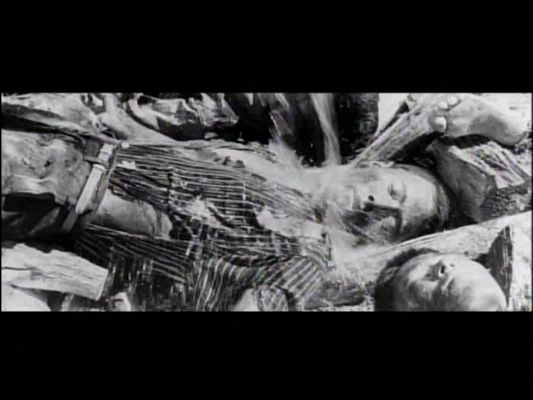[HanCinema's Film Review] "The Sea Knows" + Full Movie
 By Panos Kotzathanasis | Published on
By Panos Kotzathanasis | Published on
It turns out that Kim Ki-young did not only direct psychosexual horror movies in the style of "The Housemaid" but also dealt in other kind of styles, as the present one follows a melodramatic approach regarding the student soldiers that were conscripted by the Japanese Occupation Forces close to the end of WW2. This approach, however, is somewhat peculiar, while the ending seems completely disconnected with the rest of the aesthetics. Let us take things from the beginning though. (I should also note here that the film quality is not exactly the best, while the sound is missing completely from a number of parts.
Advertisement
The story begins in January 1944, where two students, Arowooon, who was on a blacklist for defying the proconsul, and tall judo practitioner Inoue, are conscripted as student soldiers for a transportation troop in Nagoya, Japan. Their training is rather brutal, with the incidents of violence being constant, particularly towards the two of them, who stand out for different reasons. Veteran Private Mori in particular, seems set to make their lives a living hell, essentially treating them as animals, which, as a higher up mentions at some point, is what the Koreans are according to the Japanese military. The two endure however, and Inoue in particular, even manages to get a promotion, upon which Mori also gets his share of punishment. Arowoon on the other hand, finds himself having a relationship with a Japanese girl named Hideko, despite the protests of her mother, who does not even want to hear about Arowoon. Another soldier, Suzuki, also finds himself on the same side of Mori's treatment, but his fate becomes much worse, particularly after the US Forces start gaining significant ground.
The rather strange element here is the way Kim Ki-young decides to portray all the violence during the training of the student soldiers, which actually starts with slaps towards the men for no reason, continues with intense insults against Koreans, and ends up with disgraceful orders, as in the case where Mori asks Arowoon to lick his boots. These events however, are presented through an approach that seems cheerful, since the soldiers seem to be laughing quite frequently during all the violence and the insults, even to the point that there are moments that one could say they are enjoying themselves. The almost constant music that accompanies these sequences adds to this sentiment of cheerfulness, which seems completely out of context as a whole, as if Kim did not know if he wanted to shoot a comedy or a drama. The way the US soldiers are presented also adds to this approach, with their constant asking for food following the same mixed line.
The romantic aspect on the other hand, plays out quite nicely, with the dramatic/comedic approach this time being well implemented, with the hardships Arowoon has to face to meet Hideko being the main source of the first and the interactions with her mother, the second. In that regard, the film benefits the most from the performances here, with Kim Wun-ha as Arowoon, Gong Midori as Hideko and Ju Jeung-ryu as her mother giving excellent performances, even if occasionally too melodramatic, essentially carrying the film on their shoulders in that regard. The other significant pole in terms of acting comes from Lee Ye-chun as Private Mori, who presents a great villain, being equally harsh, weak, cowards and exploitative, in a rather demanding role he fulfills to the fullest.
The ending however, starting with Mori's reaction and the way he uses Suzuki, to the bombing of the plains and the group cremations of the victims the Japanese soldiers performed, changes completely style, with the blights of war being presented in a style that is realistically brutal, and, at the same time, somewhat ritualistic. Arowoon's walk among the disaster is the most impressive scene in the film, also for the distinct anti-war message it presents, but at the same time, completely different in style than the rest of the movie, particularly through the "tour guide to hell" sense it emits.
Choe Ho-jin's cinematography finds its apogee in these scenes, which are truly magnificent in their grotesqueness. Regarding the rest of the movie, his work is also quite good, especially in the focus on the faces of the various protagonists, but in no way, of the same level with the last part. Oh Young-keun's editing is among the best aspects of the movie, with the way he connects the different scenes, the inclusion of actual footage from the war and the slowing of the pace during the last part, being excellent.
"The Sea Knows" is a weird film. Uneven, unorthodox, mixing genres for no particular reason, and with a direction that seems misguided, for lack of a more accurate term. At the same time, however, this is what makes it such an interesting movie, while the finale will definitely stay on the mind of anyone who watches it.
Review by Panos Kotzathanasis
___________
"The Sea Knows" is directed by Kim Ki-young, and features Gong Midori, Kim Wun-ha, Kim Jin-kyu, Ju Jeung-ryu, Kim Ji-mee, Lee Ye-chun. Release date in Korea: 1961/11/10.
 Panos Kotzathanasis
Panos Kotzathanasis
Panos Kotzathanasis is a film critic and reviewer specialising in East Asian Cinema. He is the founder of Asian Film Vault, administrator of Asian Movie Pulse and also writes for Taste of Cinema, Eastern Kicks, China Policy Institute and Filmboy. You can follow him on Twitter and Facebook. Panos Kotzathanasis can be contacted via sinkazama82@gmail.com.


